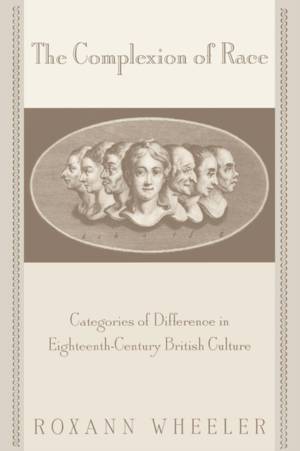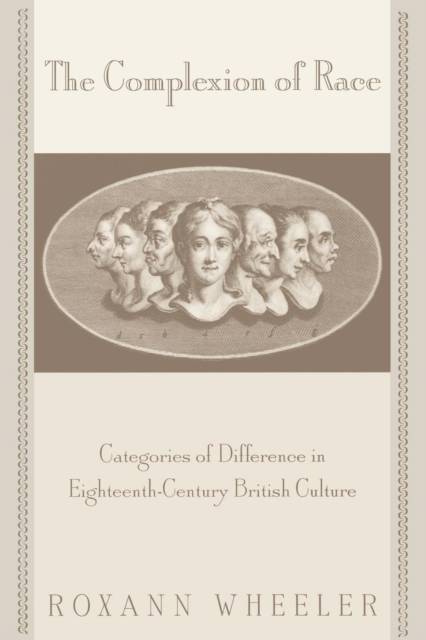
- Retrait gratuit dans votre magasin Club
- 7.000.000 titres dans notre catalogue
- Payer en toute sécurité
- Toujours un magasin près de chez vous
- Retrait gratuit dans votre magasin Club
- 7.000.0000 titres dans notre catalogue
- Payer en toute sécurité
- Toujours un magasin près de chez vous
The Complexion of Race
Categories of Difference in Eighteenth-Century British Culture
Roxann Wheeler
69,45 €
+ 138 points
Description
The Complexion of Race Categories of Difference in Eighteenth-Century British Culture Roxann Wheeler "A substantial contribution to the investigation of the concept of 'race' as a determinant of identity in the eighteenth century. Wheeler convincingly demonstrates that the contemporary inclination to frame questions of personal and social identity in terms of a binary opposition of white and black has been anachronistically applied to the eighteenth century, when 'multiplicity'--the use of overlapping or even competing categories--was common practice."--Vincent Carretta, University of Maryland "Wheeler's book charts the emergence of skin color as the distinguishing feature of 'race' in Britain and the British empire. She identifies the 1770s as the time when the old distinction between heathen and Christian gave way to the new dominant distinction between black and white. Although she touches on what might now be seen as anthropological sources, her concentration is on historical narratives, travelogue, and fiction, and on the comparison of these latter sources to the anthropology or natural history of the time and, at times, to the politics of abolition and emancipation."--Eighteenth-Century Life "The Complexion of Race marks a decisive break with literary history's binary version of eighteenth-century British radical thought."--Journal of Social History In the 1723 Journal of a Voyage up the Gambia, an English narrator describes the native translators vital to the expedition's success as being "Black as Coal." Such a description of dark skin color was not unusual for eighteenth-century Britons--but neither was the statement that followed: "here, thro' Custom, (being Christians) they account themselves White Men." The Complexion of Race asks how such categories would have been possible, when and how such statements came to seem illogical, and how our understanding of the eighteenth century has been distorted by the imposition of nineteenth and twentieth century notions of race on an earlier period. Wheeler traces the emergence of skin color as a predominant marker of identity in British thought and juxtaposes the Enlightenment's scientific speculation on the biology of race with accounts in travel literature, fiction, and other documents that remain grounded in different models of human variety. As a consequence of a burgeoning empire in the second half of the eighteenth century, English writers were increasingly preoccupied with differentiating the British nation from its imperial outposts by naming traits that set off the rulers from the ruled; although race was one of these traits, it was by no means the distinguishing one. In the fiction of the time, non-European characters could still be "redeemed" by baptism or conversion and the British nation could embrace its mixed-race progeny. In Wheeler's eighteenth century we see the coexistence of two systems of racialization and to detect a moment when an older order, based on the division between Christian and heathen, gives way to a new one based on the assertion of difference between black and white. Roxann Wheeler teaches English at Ohio State University. New Cultural Studies 2000 384 pages 6 1/8 x 9 1/4 ISBN 978-0-8122-3541-8 Cloth $69.95s £45.50 ISBN 978-0-8122-1722-3 Paper $32.50s £21.50 World Rights Cultural Studies, History, Anthropology Short copy: "The Complexion of Race marks a decisive break with literary history's binary version of eighteenth-century British radical thought."--Journal of Social History
Spécifications
Parties prenantes
- Auteur(s) :
- Editeur:
Contenu
- Nombre de pages :
- 384
- Langue:
- Anglais
- Collection :
Caractéristiques
- EAN:
- 9780812217223
- Date de parution :
- 12-06-00
- Format:
- Livre broché
- Format numérique:
- Trade paperback (VS)
- Dimensions :
- 152 mm x 229 mm
- Poids :
- 562 g

Les avis
Nous publions uniquement les avis qui respectent les conditions requises. Consultez nos conditions pour les avis.






